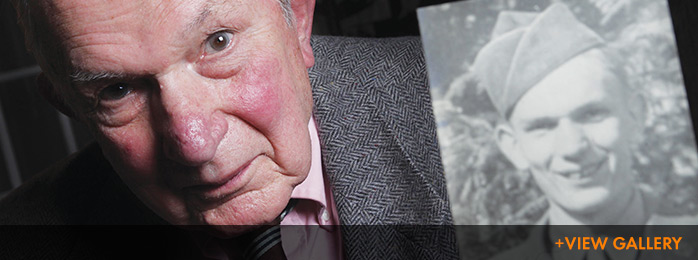Man of Honor
France Awards Walter Barthold, Jr., '48, Its Highest Recognition for Service in World War II
Like so many college students of his generation, Walter Barthold ’48 went from studying history to living history during the tumultuous years of World War II.
After only one term, lack of funds forced the Winnetka, Illinois, native to drop out of Northwestern, and at age 18, in January 1943, he joined the Army. The years that followed were lessons in the school of life and death: chasing the Germans out of France, witnessing incredible bravery, and staring down his own fears at the front—sometimes under heavy fire—as a radio operator with the 80th Infantry Division. The French government recently awarded Barthold the Chevalier medal of the Legion of Honor, for his part in liberating France; the award was created by Napoleon Bonaparte in 1802 to recognize those who uphold liberty and equality, no matter their country of origin.
His memories of those extraordinary times haven’t dimmed in almost 70 years. Barthold landed with the 80th Infantry Division at Utah Beach in France on August 2, 1944. There was still fighting in Normandy even two months after D-Day.
“Then the 80th Division took part in the drive across France, across the Moselle River in the east of the country. There was a lot of fighting in Lorraine; we were heavily engaged. We left France in December to go up to Luxembourg for what they called the Battle of the Bulge, the German Ardennes counteroffensive. It was the coldest winter in Europe up to that time in the whole century. Seeing men enduring hardships like that….
“I was scared; I was terribly scared. Everybody was. In the three-week period that I was at the front, it was dangerous. People got hurt and killed but I knew it was important, I had a job to do.”
The Army had trained Barthold as a radio operator—the communications expert of his day—because of his aptitude for international code. Most of the time Barthold was in the signal corps. Part of a four-man team, he was usually stationed at division headquarters where he received intelligence messages from the different units in the 80th division and passed them along to the G-2, the intelligence branch of the Army.
But in the fall of ’44, Barthold served as personal radio operator to a battalion commander, and that meant front-line duty.
“During an attack the battalion commander had to keep the regiment informed as to how things were going and also receive messages from other units. The best communication was by telephone lines but it took time to lay those down. We’d move forward on an attack and provide first-instance communication by radio.
“The Germans jammed our stations constantly,” he recalls. “We had to change frequencies every day to keep one jump ahead of the Germans.”
The 80th Infantry Division was part of the Third Army, whose legendary leader was General George S. Patton. Barthold remembers Patton as much for his flamboyance and strictness as for his leadership skills.
“He was dressed very fine and his general’s stars were very prominent. He always wore two ivory-handled pistols. You always knew when General Patton was coming to the front: he came in a convoy with a lot of sirens. He was conspicuous and loud spoken. I have to say he was not popular among the men. The newspapers called him ‘Old Blood and Guts,’ and we used to say, ‘his guts, our blood.’”
Barthold returned from the war without a scratch but the experience of seeing men killed and badly wounded has never left him, nor has the memory of his fellow soldiers’ grace under fire.
“I saw superhuman courage, many instances of it, often carried out as a matter of routine from day to day. Men risked their lives without having to do so—to accomplish an objective or to save a friend.”
The Walter Barthold who returned to Northwestern to finish his degree was a far different man than the one who had left for war.
“I had grown up; I had mingled for three years with men from all walks of life. And I had a much better knowledge of human nature.” He says the veterans generally socialized with one another at Northwestern and were serious students. The GI Bill enabled him to finish his degree in political science, and his good grades and Northwestern diploma were his entrée into Yale Law School. He then practiced in New York City for more than 50 years as a civil trial lawyer. He has two sons, one daughter, and five grandchildren.
But perhaps he is most grateful to Northwestern and its “very fine Romance Languages Department” for his fluency in French, which has allowed him to indulge in his love of all things French over the years and enjoy many trips to France with his wife.
Barthold’s love affair with France began with the wartime chase of the Germans. “The French people were out on the streets everywhere as we moved through the towns and cities. They were encouraging us and waving us on. It was a high point of my life.”
Apparently the affection is mutual. The French ambassador to the United States, François Delattre, came to Manhattan on Veterans’ Day 2011 to award the Chevalier medal to Barthold and 41 others, expressing the gratitude of his nation: “The French people will never forget your courage and devotion to the great cause of Freedom.” The medal now hangs on the wall of Barthold’s study, ready to be taken down at a moment’s notice and shown proudly to his friends.
Back to top